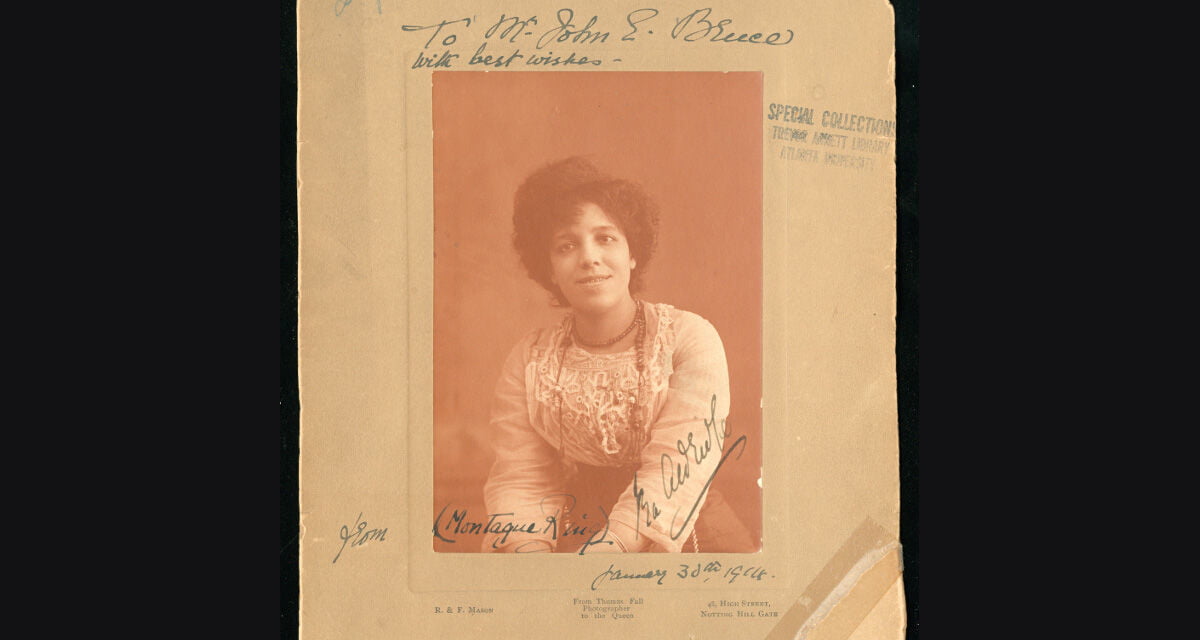Name: Amanda Christina Elizabeth Aldridge
Born: 10 March 1866
Died: 9 March 1956
Place of birth: London, UK
Known for: Afro-British opera singer and teacher who composed under the pseudonym of Montague Ring.
Career
Amanda Aldridge started her singing career at the tender age of 15. In 1881 she sang with an orchestra at the Crystal Palace, performing works by Handel. In 1883 she won a scholarship to the then new Royal College of Music. At that time, 50 of these positions were offered to entering pupils, only nine of which were awarded to singers.
She studied voice under Jenny Lind and Sir George Henschel. She also studied piano and was an accomplished accompanist, often playing with her sister, the opera singer Luranah Aldridge.
Aldridge possessed a rich contralto voice and had a successful career as a concert singer, performing under the name Amanda Ira Aldridge, a reference to her father, the African-American actor Ira Frederick Aldridge. Her varied repertoire included Italian arias, German lieder and English country songs, with works from contemporary composers such as Samuel Coleridge-Taylor, Herbert Parry and Maud Valerie White.
Her singing career was cut short after a bout of laryngitis, after which her voice never fully recovered. She retired from singing in 1907. After this she concentrated on teaching and composing.
Aldridge’s career as a vocal coach was as impressive as her voice. Her students included African-American performers such as tenor Roland Hayes, singer, composer and pianist Lawrence Benjamin Brown, contralto Marian Anderson, and bass-baritone and film and stage actor Paul Robeson. Aldridge was still giving piano and voice lessons at the age of 86.
Under the pseudonym Montague Ring, she composed around 30 songs in the romantic parlour style between 1907 and 1925, as well as instrumental music in other styles. Parlour music was, at the time, a popular genre intended to be sung live with piano accompaniment in middle-class living rooms – this was a time before record players, after all.
Aldridge used music to explore her mixed ethnic heritage, combining numerous rhythmic influences and genres with poetry by Black American authors.
It is thought that she used the pseudonym as a way of separating her composing career from her singing and teaching. It seems that the public were in general aware of her real identity. It can be of no doubt that she was a trailblazer for both Black and female performers.
Personal life
Amanda Aldridge was born on 10 March 1866 in Upper Norwood in south London. She was the third child of the acclaimed African-American actor Ira Frederick Aldridge and his second wife, Amanda Brandt, a Swedish concert singer.
She had an older half-brother, Ira Daniel, from her father’s first marriage to Margaret Aldridge. She had two older sisters, Rachael and Luranah (both born while Ira was still married to his first wife). The latter was a star operatic contralto until illness forced her to retire. A younger brother, Ira Frederick, was born just four months after their father died. Aldridge herself was only a little over a year old at the time.
Ira Aldridge was an American-born actor who, in 1824, emigrated to England to escape discrimination in his native country. He became a well-known and respected actor on European stages, becoming the first Black actor to play such Shakespearian roles as King Lear, Shylock and Macbeth.
He died suddenly while on tour in Poland. Amanda Brandt, herself an accomplished singer, went to great lengths to keep her husband’s African-American heritage and the legacy of his acting career alive in their children. She took them to concerts at Crystal Palace and encouraged them in their own artistic endeavours.
Amanda Aldridge dedicated much of her life to caring for first her mother, who died in 1915, and then her sister Luranah, when she became ill with chronic rheumatoid arthritis. Luranah was afflicted with crippling pain and was confined to a wheelchair under Amanda’s care for some 20 years.
Aldridge had to turn down an invitation in 1921 from W E B Du Bois to attend the second Pan-African Congress because she was caring for her sister. She explained in a note to him: “As you know, my sister is very helpless … I cannot leave for more than a few minutes at a time.”
Aldridge died in London on 9 March 1956, a day before her 90th birthday, following a short illness. She was buried in Streatham Park cemetery.
Did you know?
In 1930, when Paul Robeson was performing as Othello in the West End, Aldridge was in attendance, and gave him the gold earrings that her father had worn when he played the part.
Best-known works
Amanda Aldridge was exceptionally well known in her lifetime, but has sadly since fallen out of favour. Her most famous work was the piano composition ‘Three African Dances’, written in 1913 and influenced by West African drumming. Also among her best-known works were ‘Three Arabian Dances’ (1919) and ‘Carnival Suite of Five Dances’ (1924).
Image
Although largely unknown today, Amanda Aldridge was a famous and successful opera singer, vocal coach and composer during her lifetime (via Wikimedia Commons).


I am amazed with Amanda Aldridge life and her music. Here Carnival Suite of Five Dances is amazing.